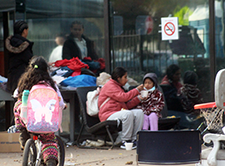Since August of 2022, over 19,000 migrants have come from the U.S. southern border to Chicago—thousands of whom are now camped out in the city's police stations and airports.

Migrants residing at a North Side police station
in November. Photo by Dave Glowacz.
According to the city of Chicago, most the migrants have come from Venezuela. What caused them to flee their homeland?
A recent report from the Great Cities Institute of the University of Iliinois at Chicago gives some clues.
The report is titled, "The Current Migrant Crisis: How U.S. Policy Toward Latin America Has Fueled Historic Numbers of Asylum Seekers." Its author, Juan González, is a senior research fellow at the institute—and a co-host of the long-running "Democracy Now!" news broadcast.
In these excerpts from the 17-page report, González describes the U.S. government's economic pressures on the nation of Venezuela:
"In late 2014 President Obama signed an executive order—not publicly released until March 2015—in which he declared that conditions in Venezuela had become a national emergency and an 'extraordinary threat to the national security and foreign policy of the United States.' The order never spelled out exactly how a small South American country hundreds of miles away, with a standing army of only 100,000 troops, could suddenly become a threat to world’s most powerful nation. Nonetheless, Obama launched a series of economic sanctions against Venezuela."
"His successor Donald Trump followed in 2017 with even broader sanctions which closed off Venezuela's access to Western debt financing, forced many U.S. and foreign companies to leave the country, and crippled its oil industry, the Venezuelan government’s main source of revenue. Trump even froze the assets in 2019 of CITGO Petroleum, a U.S. company that is wholly owned by Venezuela’s state oil company. CITGO’s refineries and gas stations in the U.S. are enormously valuable. In 2022 they generated . . . more than $2.8 billion in profit, but Trump’s actions effectively prevented any of that money from reaching the Venezuelan government and its people."
"Meanwhile, the White House joined with the United Kingdom to freeze Venezuelan gold reserves stored in the Bank of England worth an estimated $2 billion."
"The effect of these massive U.S. sanctions caused the Venezuelan state to lose between $17 billion and $31 billion in oil revenues between 2017 and 2020. Given that Venezuela normally imports 90 percent of its pharmaceuticals and 70 percent of its food, the loss of such a vast quantity of U.S. dollars from its shrinking oil exports has crippled its economy."